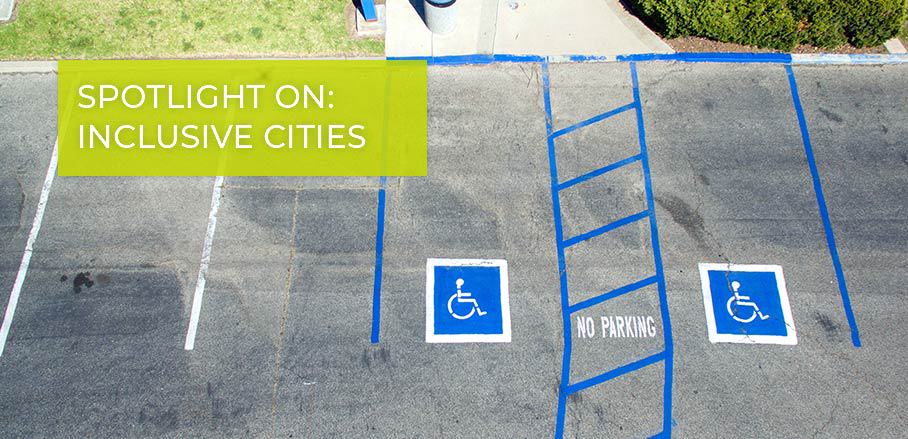Equal Access for All in Amman, Jordan
Amman’s infrastructure is not accessible to everyone. This has far-reaching consequences for people with disabilities – their everyday lives, their education, and their employment. Asia Yaghi analyses challenges and options.
Public Space and Services
People with disabilities (PWDs) face many challenges in Jordan’s capital Amman. These include the lack of accessible everyday facilities such as an elevator signal interpreter, or a car park suited to the needs of people with disabilities. Many public places are hardly accessible, such as parks, streets, or government departments – even those that are essential to the daily communication of PWDs, like the Ministry of Social Development, health centres, education directorates, or public libraries.
Another common issue is the inability of the institutions’ employees to communicate and deliver decent service to the disabled. Amman does not have accessible public transport, a lack of mobility with serious consequences, as PWDs are thus blocked from training skills, work, and education.
Education and Employment
Within the urban community, there is a lack of conviction that a PWD is a decision-maker –in making a decision for him/herself, about financial issues, or his/her life in general. This is an attitude that has to be challenged. Making municipal education systems and the job market more accessible to PWDs is an essential step in this regard.
We note that many public and private schools are not prepared to include PWDs even though they could be integrated into education : teachers are not trained to deal with disabilities according to their needs, and many parents have refused to have PWDs in their child’s school, especially in public primary schools. “I AM HUMAN” – Society for Rights of Persons with Disabilities has targeted this issue by an awareness raising campaign. This has resulted in integrating 57 students in eight governorates into governmental basic schools and amending seven schools to include of kindergartens for children with disabilities.
PWDs lack access to the job market: while many institutions declare that they need employees, very few employ PWDs. Reasons vary, in government institutions, for example, there is no one who speaks sign language, no documents are made available in braille, and buildings are not wheelchair-accessible, making public institutions an impossible place of employment for the deaf, the blind, and people with motor disabilities.
Local education policies show that PWDs are no priority for Amman’s local government, and if policies concerning PWDs are developed, they come with crippling restrictions. For example, in the Vocational Training Institution for PWDs, training programmes are not opened unless the number exceeds 10-15 people to cover the costs financially. Neither does the institution cover the students’ transportation or training materials.
It is essential that decision makers are made aware of the employees with disabilities’ potential, including cases such as a person with cerebral palsy who is an advisor to the President of the Higher Council for the Rights of Persons with Disabilities (HCD). Showcasing her creativity and the positive effects of her work conveys a positive image of PWDs and their ability to succeed on the job market.
Facilitating Communication
Furthermore, civil society organisations do not sufficiently communicate with PWDs and therefore are not sufficiently informed on relevant issues. It is important to understand that PWDs are very well able to communicate – given the appropriate environment, which is often impeded by a lack of facilitation means and the lack of electronic means, especially during the pandemic. As a consequence, civil society organisations working with PWDs have difficulties in addressing decision makers and requiring them to enforce the laws ensuring that PWDs have access to their rights.
I AM HUMAN has worked to facilitate communication between PWDs, civil society organisations, and decision-makers. A special focus in this regard is given to protecting women with disabilities from violence. In addition to trainings, we communicate with women to prepare them for advocacy.
Furthermore, we have been conducting trainings on political participation of PWDs and activities such as The Right March 2018, which we carried out to raise awareness of laws and of involving PWDs in decision-making. These efforts have been effective, as for example the nomination of three PWDs in Amman’s municipal council elections underlines.
Within communities across the country, we continue to conduct sessions, seminars, lectures, and trainings addressing employers, public servants, local government officials, teachers, and, of course, PWDs themselves. During these events, PWDs report on issues that have occurred in their daily lives and how they have overcome them.
With “I AM HUMAN” – Society for Rights of Persons with Disabilities we aim to change things for the better. It was established in 2008, with PWDs constituting the majority of its members. IAH is concerned with providing PWDs, especially women, with equal access to all spheres of community life, including realisation of all social, economic, political, cultural, health, and legal rights as mandated for (PWDs) by national law (No. 20/2017) and referenced by the Convention on the Rights of PWDs (CRPD).
Our message to decision makers: guarantee access to justice and equality, without discrimination and ensure enforcement of laws, especially 20/2017, ensuring that Jordan’s cities become truly inclusive.
- Equal Access for All in Amman, Jordan - 22. April 2021
